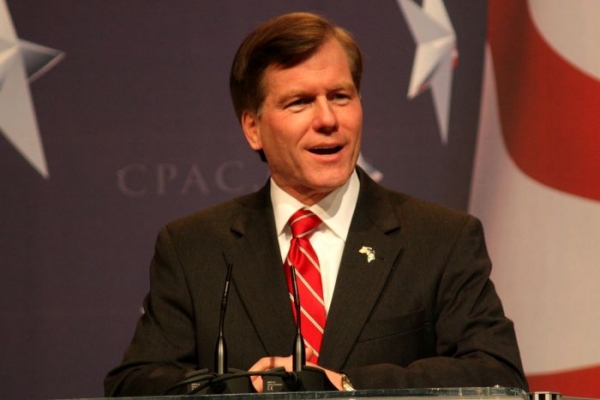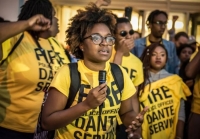He is otherwise known as Don E. Siegelman, the former governor of Alabama, whom many of those same people supported when the justices decided — twice — that his conviction did not warrant an extended review.
“I’m not the slightest bit bitter about that at all,” Siegelman said last week in a telephone interview from prison. “I’m delighted that the court has taken the McDonnell case, and I’m hopeful the court will clarify what constitutes political quid pro quo bribery.”
Most convicted politicians who ask the Supreme Court for relief — former Illinois governor Rod Blagojevich and former congressman William Jefferson of Louisiana being just recent examples — meet fates similar to Siegelman’s.
But the longtime Alabama officeholder was the cause celebre — still is, really — for those who believe vague federal corruption laws give politically ambitious prosecutors too much leeway in deciding what and whom to investigate. Such questions about political influence are only likely to grow as relaxed campaign contribution laws give rise to a new galaxy of individual mega-donors.
While the Supreme Court never accepted Siegelman’s case for full briefing, McDonnell grabbed the brass ring twice.
Not only is the court reviewing his 2014 conviction in its last oral argument of the term Wednesday, but the justices intervened at the final hour last fall to keep McDonnell from having to report to prison while the legal drama played out.
That was something the court had never done before, Solicitor General Donald B. Verrilli Jr. told the justices before they acted.
But McDonnell and his supporters said the circumstances of his conviction — he, his wife and family received $177,000 in luxury items, vacations and loans from businessman Jonnie R. Williams Sr., although there was no direct evidence McDonnell ordered state officials to take actions that Williams wanted — demanded high-court review.
“This case marks the first time in our history that a public official has been convicted of corruption despite never agreeing to put a thumb on the scales of any government decision,” Washington lawyer Noel Francisco, representing McDonnell, wrote in his brief to the court.
“Quid pro quo” translates from the Latin to “something for something.” McDonnell’s attorneys acknowledge the governor got something — Virginia’s laws did not forbid the gifts — but said he gave nothing.
Siegelman’s case is the reverse. He gave Alabama health-care executive Richard Scrushy a new term on an important industry regulatory board. But Scrushy’s offering was a $500,000 campaign contribution to push a referendum measure for a lottery that would benefit the state’s underfunded school system.
“The Siegelman case was different from all others,” Siegelman said, in the detached tone of the Georgetown Law graduate that he is. “There was no personal benefit, not a penny of any financial gain. There wasn’t any self-enrichment scheme. There was no testimony of a quid pro quo, much less an explicit or express quid pro quo. And the contribution was not even to me but to a ballot initiative.”
Andrew P. Miller, a former Virginia attorney general, agrees with Siegelman, a Democrat, and McDonnell, a Republican. Miller helped drum up support for both men as they presented their cases to the Supreme Court.
“I’m bipartisan in my concern about this,” he said.
The similarity he sees is that both men were rising stars in their respective parties brought down by prosecutors appointed by the president of the opposite party.
Grant Woods, a former Republican attorney general from Arizona, said that, if anything, Siegelman had the bigger complaint.
“The Siegelman case to me is a complete travesty of justice from start to finish,” Woods said. The McDonnell case, on the other hand, “is just more of an interesting legal question.”
The question is when favors that politicians do for those who give them gifts or campaign contributions cross the line into the “official acts” of governing that bribery statutes require.
Woods decided not to join the brief of 77 former attorneys general in the McDonnell case. Almost evenly divided among Democrats and Republicans, they say the legal definition of “official act” that emerged from McDonnell’s conviction “threatens to criminalize wide swaths of state political life.”
Woods was troubled by Williams’s largesse — the shopping sprees for Maureen McDonnell, the Rolex watch for the governor, footing the bill for their daughter’s wedding reception and loans that kept the financially strapped couple afloat.
“Whether it was his wife’s idea or not,” Woods said, referring to McDonnell’s defense that Maureen was the motivator, “there were a lot of things going on.”
The government charged that the McDonnells used the power of the governor’s office to help Williams promote a dietary supplement his company was developing.
Prosecutors said McDonnell repaid Williams’s generosity by arranging meetings to connect the businessman with state officials, allowing Williams to throw a luncheon at the governor’s mansion to help launch the product and letting him shape a guest list at a mansion reception meant for health-care leaders.
In its brief to the Supreme Court, the government rejects McDonnell’s argument that it is required to show that McDonnell personally commanded state officials to take action — Williams never got the state studies he hoped for — or that such favors are routine for those who give politicians gifts or contributions.
Verrilli, the solicitor general, said McDonnell implies that access “may be sold in a quid pro quo exchange for a campaign contribution or, by necessary implication, for a personal payoff.”
“By that logic,” Verrilli said, “a member of Congress could condition the performance of routine constituent services on a $100 campaign contribution, and a governor seeking reelection could demand a $1,000 contribution or a personal loan as the price of any official meeting with a senior member of his administration. Such exchanges plainly are not a central feature of democracy.”
Jurors in McDonnell’s 2014 trial said they had no trouble finding he broke the law. He was sentenced to two years in prison; Maureen McDonnell received a year and a day. (Her appeal is on hold at a lower court.)
A panel of the U.S. Court of Appeals for the 4th Circuit unanimously upheld the conviction. But McDonnell and his attorneys said that is because the courts have misinterpreted the definition of an “official act.”
In recent years, the Supreme Court has limited the legal scope of what is considered public corruption. In campaign finance cases, including Citizens United v. FEC, the court has noted that mere political favors for contributors do not amount to corruption.
And in a case involving former Enron executive Jeffrey Skilling, the court scaled back one of federal prosecutors’ favorite tools for pursuing corrupt politicians and self-dealing corporate chiefs. The court narrowed the definition of what constitutes depriving the public or a company of a leader’s “honest services,” essentially saying it had to involve accepting bribes or kickbacks to be criminal.
Defense attorneys at McDonnell’s trial argued that there was no evidence McDonnell promised Williams he would grant the businessman’s request for state-funded studies of his product, Anatabloc. The studies never took place.
But Williams, who was granted immunity by prosecutors, testified that the governor always knew why he was being so generous.
McDonnell has not granted interviews during his legal troubles but issued a statement after the Supreme Court accepted his case.
“I am innocent of these crimes and ask the court to reverse these convictions,” he said. “I maintain my profound confidence in God’s grace to sustain me and my family, and thank my friends and supporters across the country for their faithfulness over these past three years.”
Siegelman, now 70, and his supporters have been at it a lot longer than that, starting after his indictment in 2004, and they are anything but reticent.
A famous “60 Minutes” piece explored the theory that Siegelman’s conviction was the work of Republican prosecutors affiliated with President George W. Bush’s political adviser Karl Rove. Siegelman recently spent 27 days in solitary confinement for what prison officials said was an unauthorized interview on liberal Thom Hartmann’s radio program.
There is a documentary in the works on his case, “Atticus v. The Architect.” The references are to Atticus Finch, the progressive Southern lawyer who is the hero of “To Kill a Mockingbird,” and to Rove’s nickname, provided by Bush, as the architect of Republican political strategy.
Actor Martin Sheen narrates the trailer for the film, which Siegelman hopes will be released this summer. His supporters recently put up for auction on eBay one of his prison T-shirts — shirts are one of the few things inmates can purchase and own themselves — and a donor paid $4,500. The proceeds go to the film.
Siegelman’s son Joseph, who was 11 when his father’s legal troubles began, now serves as his attorney. He has filed a suit against the Justice Department’s Office of Professional Responsibility seeking prosecution files.
The Supreme Court’s decision in McDonnell’s case will not affect Siegelman. He is nearing the completion of his sentence and hopes to be sent to a halfway house or home confinement next year.
But he said he hopes the court provides clarity. “Everybody who’s involved in politics, for the most part, all they want is a line of demarcation. Where does politics stop and where does crime start?”
Siegelman said his hopes are with a petition to the White House asking for a pardon.
“Who knows, the documentary that’s being produced may get enough traction to attract the president’s attention,” Siegelman said last week as a prison counselor monitored the call. “It’s possible this will strike the president as an injustice and an anomaly in the criminal justice system and he may want to take some action to rectify it.”
Link to original article from The Washington Post

















 Imagine going to the polls on Election Day and discovering that your ballot could be collected and reviewed by the
Imagine going to the polls on Election Day and discovering that your ballot could be collected and reviewed by the "These disasters drag into the light exactly who is already being thrown away," notes Naomi Klein
"These disasters drag into the light exactly who is already being thrown away," notes Naomi Klein  How about some good news? Kansas Democratic Representative advances bill for Native Peoples.
How about some good news? Kansas Democratic Representative advances bill for Native Peoples.  What mattered was that he showed up — that he put himself in front of the people whose opinions on
What mattered was that he showed up — that he put himself in front of the people whose opinions on On a night of Democratic victories, one of the most significant wins came in Virginia, where the party held onto
On a night of Democratic victories, one of the most significant wins came in Virginia, where the party held onto A seismic political battle that could send shockwaves all the way to the White House was launched last week in
A seismic political battle that could send shockwaves all the way to the White House was launched last week in In an interview with Reuters conducted a month after he took office, Donald Trump asserted that the U.S. had “fallen
In an interview with Reuters conducted a month after he took office, Donald Trump asserted that the U.S. had “fallen The New England Conference of United Methodist Churches voted this past Saturday on a resolution declaring that the Christian thing
The New England Conference of United Methodist Churches voted this past Saturday on a resolution declaring that the Christian thing